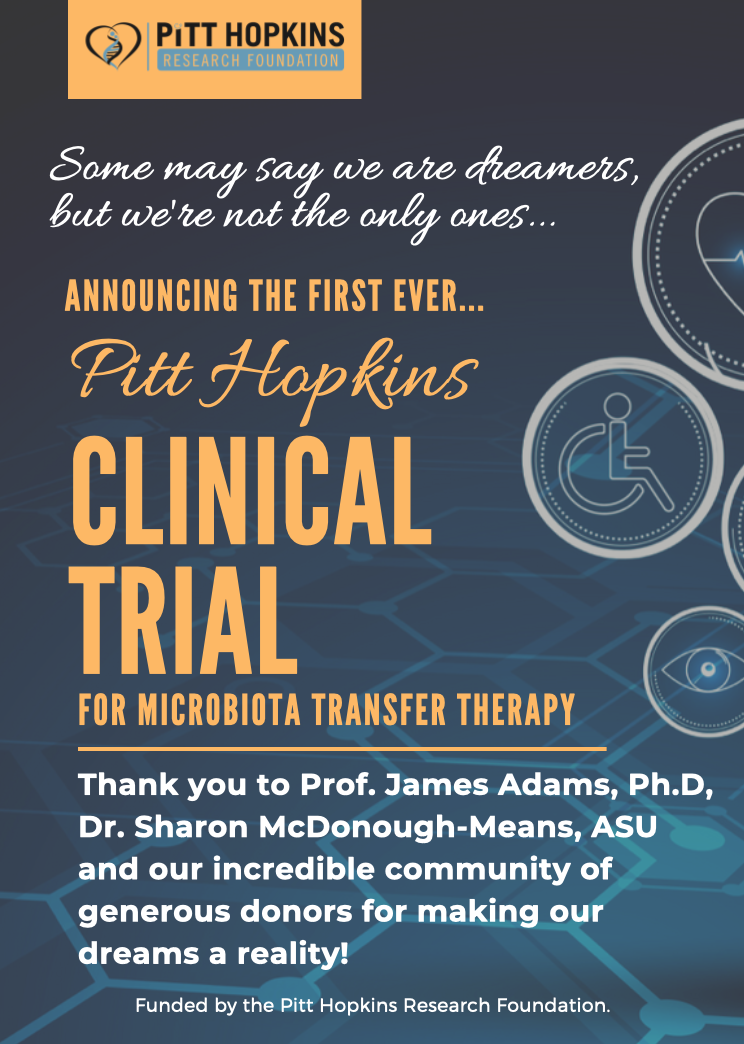Microbiota Transfer Therapy Clinical Trial
Pitt Hopkins Research Foundation Announces First-ever Human Trial; Eradicating Gastrointestinal Challenges Through Microbiota Transfer Therapy
(Tempe, Ariz., September 30, 2019) – The Pitt Hopkins Research Foundation announces its first-ever human clinical trial to attempt to eradicate the severe gastrointestinal effects of Pitt Hopkins syndrome (PTHS), a rare disorder caused by a mutation of the TCF4 gene (18 chromosome) and often classified on the Autism spectrum. In partnership with Arizona State University’s (ASU) Autism/Asperger’s Research Program, a clinical trial is scheduled to begin early 2020 focused on Microbiota Transfer Therapy (MTT), also known as a fecal microbiota transplant.
“This clinical trial is a huge milestone for our young foundation,” said Audrey Davidow Lapidus, president of the Pitt Hopkins Research Foundation and mother to Calvin, diagnosed at one-years-old with PTHS. “Not only do we hope the trial will bring some much-needed relief for our children living with PTHS, it signals the continued growth of the Pitt Hopkins Research Foundation as a serious player in the medical research field,” she added.
The trial will be led by Prof. James Adams, Ph.D., director of the Autism/Asperger’s Research Program and President’s professor in the School of Engineering of Matter, Transport and Energy at ASU, and Prof. Rosa Krajmalnik-Brown, Professor in the School of Sustainable Engineering and the Built Environment and the Biodesign Swette Center for Environmental Biotechnology.
According to their previous team’s research, “studies have reported abnormal gut microbiota in individuals with Autism Spectrum Disorders (ASD), suggesting a link between gut microbiome and autism-like behaviors. Modifying the gut microbiome is a potential route to improve gastrointestinal (GI) and behavioral symptoms in children with ASD, and fecal microbiota transplant could transform the dysbiotic gut microbiome toward a healthy one by delivering a large number of commensal microbes from a healthy donor.”[1]
Their research noted Autism symptoms were reduced by nearly 50% two years after fecal transplant in their trial participants, and consequently attracted the Pitt Hopkins Research Foundation’s attention. They approached Prof. Adams to propose another trial, this time with participants living with PTHS. Approximately 75% of those living with PTHS experience at least some GI discomfort, with many suffering from debilitating and severe constipation, low motility and food sensitivities.
“Prof. Krajmalnik-Brown and I are honored to be working with the Pitt Hopkins Research Foundation, and we hope that our microbiota transplant therapy is able to improve the chronic constipation and other gut problems in children with Pitt-Hopkins Syndrome,” said Prof. James Adams.
“Critical to our previous study was our assessment of substantial improvements of the gut microbiome caused by treatment. This was an important blinded and non-biased assessment that elevated the validity and scientific merit of our study, we will implement similar microbiome techniques and measurements in this study”, said Prof. Rosa Krajmalnik-Brown.
The study physician, Dr. Sharon McDonough-Means, MD, says “This study is of special interest as it offers the possibility of help for PTHS children with their often significant gut problem but also it may shed light on the mechanism by which the known genetic defect causes the health difficulties for these children”.
This is a randomized, double-blind, placebo-controlled study. Part one of the study involves a 14-week treatment with MTT, and then the placebo group will be switched. The study will evaluate gastrointestinal symptoms as well as all symptoms that commonly occur in Pitt Hopkins patients. Other research studies are currently underway for MTT for use in children and adults with autism spectrum disorder, and in individuals with Clostridium Difficile infections.
To learn more about this trial, and other Frequently Asked Questions, please visit here.


